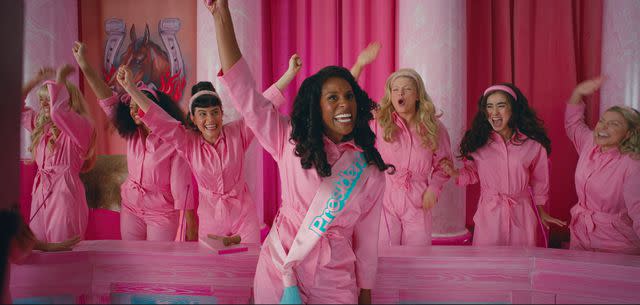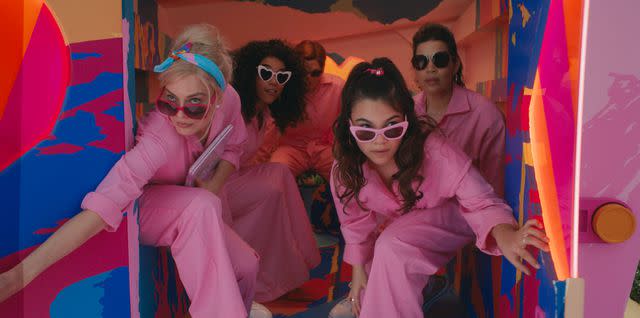Of Course, the Barbie Movie Is Feminist—The Doll Has Been All Along
- Oops!Something went wrong.Please try again later.
Given all the feminist trails Barbie has blazed over the decades, it's no surprise Barbie's major motion picture debut is bursting with girl power.

Courtesy Warner Bros. Pictures
When the first teaser trailer for Barbie dropped last December, the 2001: A Space Odyssey-style scene (which also happens to be the film’s opening) offered a valuable nugget of Barbie history.
For centuries, little girls had dolls—baby dolls, specifically, and therefore, the type of pretend play they could engage in with their dolls was limited to imagining themselves as mothers. But in 1959, Barbie busted on the scene, and poof, everything changed.
From that point on, kids could play with a doll modeled after a teen or adult who had a range of aspirational careers. Barbie’s debut was also a sign of game-changing conversations, books and periodicals (like 1963’s The Feminine Mystique and Gloria Steinem’s Ms. magazine), and movements (from second-wave feminism to womanism) that fueled professional and political progress for women in America.
Fast-forward to 2023: It’s no surprise the Greta Gerwig-directed Barbie movie is deeply, unapologetically feminist.
Related: Behind the Scenes: How the New Barbie for Preschoolers Is Made
Spoiler alert: Several plot points and scenes are described below.
At first blush, Barbieland—the first of the film’s two main settings (the other being the “Real World” aka Los Angeles)—is exactly what you’d expect a live-action Barbie world to look like. It's extremely pink, bright, full of dream houses, pink convertibles, and a plasticine beach where the dolls can gather to soak up the sun and wave hello to their mermaid counterparts, played by Dua Lipa and John Cena, in the faux water.
However, within minutes, you notice that Barbieland touts a pink Capitol where President Barbie, played by Issa Rae, runs the government, the land’s Supreme Court is all female, and their version of Mount Rushmore is entirely made up of trailblazing Barbies.

Courtesy Warner Bros. Pictures
Issa Rae as Barbie“Stereotypical Barbie,” played by Margot Robbie, hangs out with Nobel Prize-winning physicist Barbie and Pulitzer prize-winning journalist Barbie among other inspiring girl boss dolls. Sure, there are Ken dolls, but it’s made clear that they don’t have much going on unless, say, their Barbie invites them to a party. Barbieland is a female-dominated paradise. And clearly, pink—a hue that for decades has been inexplicably linked to femininity—is a power color.
It isn’t until Robbie’s Barbie has to enter the Real World that she learns about the patriarchy, a word that pops up a lot in the script. While Ken suddenly feels noticed, powerful, and cool, Barbie’s harassed by men on the Venice boardwalk.
Barbie learns her creator, Mattel, doesn’t have a current female CEO as she anticipated. Though she had been under the impression that Barbie had made life better for girls and women in the "Real World," she’s offered a rude awakening in the form of evisceration from 13-year-old Sasha, played by Ariana Greenblatt. Sasha tells her that Barbie is bad for young people and that she sets problematic, unrealistic beauty standards.
She also finds out from Sasha’s mom, Gloria, played by America Ferrera, it’s pretty tough to be a woman in the "Real World," between being held to ridiculous expectations and facing glaring inequality. Yet, she begins to evolve and step into her own humanity, something that’s more beautiful than anything she could have ever imagined in Barbieland. This perfect storm ultimately leads to a battle of the sexes in Barbieland.

Courtesy Warner Bros. Pictures
Margot Robbie as Barbie, Alexandra Shipp as Barbie, Michael Cera as Allan, Ariana Greenblatt as Sasha and America Ferrera as Gloria in "Barbie"In other words, the Gerwig-penned script is anything but a fluffy, two-hour commercial for a doll. It’s bursting with feminist ideas and themes that, with hope, will spur exciting, educational conversations between parents and kids about why we don’t live in a world in which women have as much power as they do in Barbieland—and why it is a problem for anyone, no matter their gender, to be made to feel like an accessory, and more.
As a proud, lifelong feminist, and someone who’s eager to read books like Loryn Brantz’s Feminist Baby and Grace Byers’ I Am Enough to my future child, I also can’t wait to show them the Barbie movie one day.
In addition to its empowering messages, Barbie is making feminist history as we speak. The film raked in $162 million at the box office during its opening weekend. Although it would be nice to applaud Greta Gerwig for her achievements without having to point to her gender (because no one ever points out that someone like, say, Oppenheimer’s Christopher Nolan is making waves as a male director), the fact is that Barbie now holds the record for the biggest box office debut ever for a film directed by a woman.
It’s just one more trail Barbie has blazed over the course of her feminist history. As a Twitter thread by BJ Colangelo points out, the first Barbie house was sold in 1962, a full decade before it became illegal for financial institutions to refuse loans to single women altogether or without a male cosigner. In 1965, the first astronaut Barbie hit the scene—almost 20 years before Sally Ride became the first human woman in space in 1983. Since 1992, Barbie has run for president every term. And the Barbie Vlog teaches kids about anti-Black racism, anti-Asian hate, gay dads, Hispanic Heritage Month, equity, diversity, inclusion, and, yep, feminist theory.
Mattel Films’ executive producer Robbie Brenner may have insisted to Time the film is “not a feminist movie.” But given Barbie’s feminist history, there is nothing else her first motion picture could have been.
Related: The Best Barbiecore Home Goods, Clothes, Toys, and More at Target Right Now
For more Parents news, make sure to sign up for our newsletter!
Read the original article on Parents.

